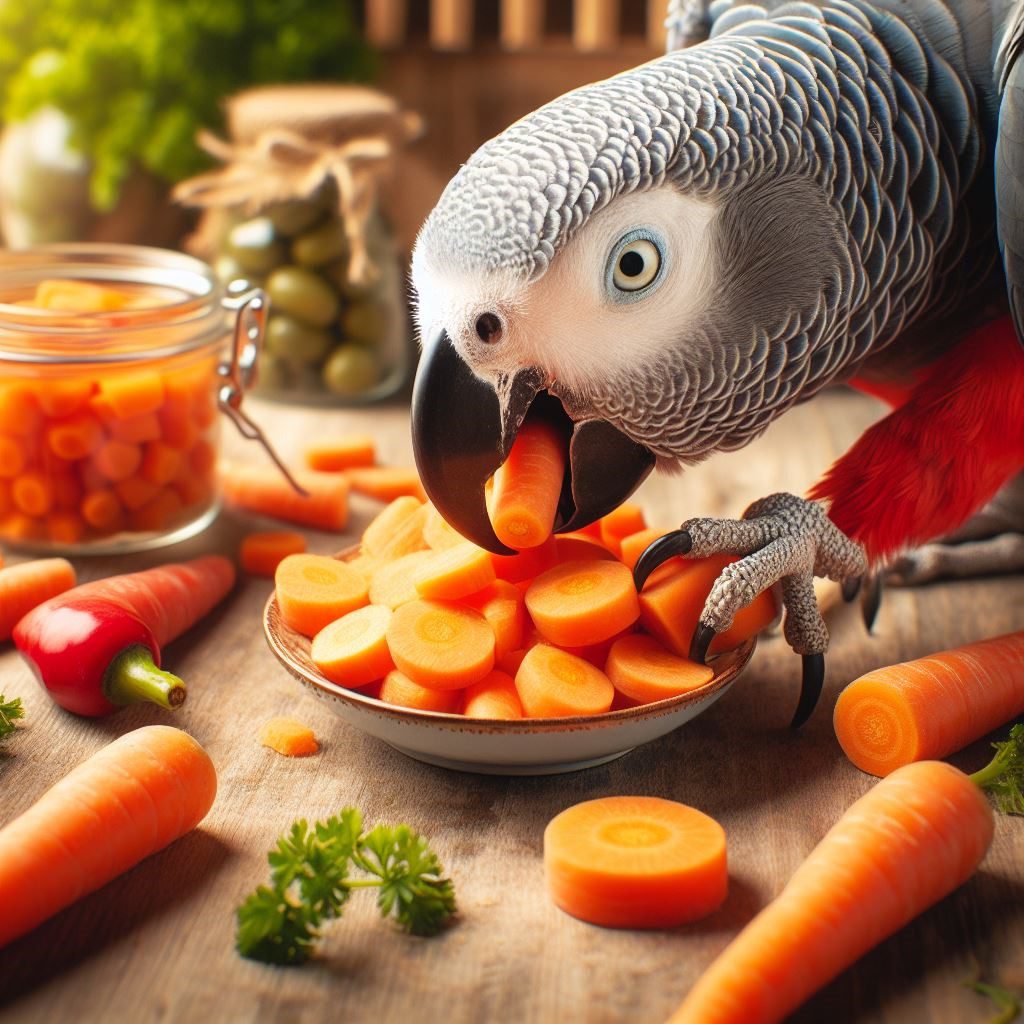Can parrots eat carrots? When I was a kid my parents would always persuade me to eat my carrots by telling me they’d make me see in the dark. Of course, this wasn’t true but the habit stuck with me my whole life and now I’m a big fan of the dark, albeit I can’t see in the dark. Carrots provide a nice crunch, and I know from experience that my parrot loves similar foods that give him this crunch but are carrots safe for parrots? Let’s find out.

Can parrots eat carrots? Yes, parrots can eat carrots they are a tasty crunchy snack that is safe for our birds to have. Not only are they delicious but carrots are also highly nutritious due to them containing vitamins A, C, and K, fiber, and potassium along with many other health benefits. Be sure to feed them raw as they provide the best nutrition and don’t lose that stimulating crunch to them.
In this article I’m going to explain the health benefits carrots bring to your parrot, can they eat carrot cake, and some other things I think you should be aware of before feeding them to your feathered friend.
Carrot Benefits For Parrots
We know carrots are good for our parrots, but just how good are they? Let’s take a closer look at the nutritional content.
A half cup of carrots contains :
| Calories | 25 |
| Protein | 0.5g |
| Carbs | 6g |
| Sugar | 3g |
| Fiber | 2g |
Vitamin A
Vitamin A is a fat-soluble responsible for your parrot’s immune system, being deficient in this vitamin will make them more open to bacterial, viral, and fungal infections.
Other health benefits include :
- Better skin health
- Improved eyesight and health
- Mucus membrane function
- Stronger bones
Broccoli, kale, spinach, and lettuce are all other safe alternatives to carrots you can feed to your bird to make sure they aren’t vitamin A deficient.
Vitamin C
Carrots also contain a healthy dose of vitamin C, an antioxidant that protects your parrot cells from damage preventing harmful disease.
Other benefits of vitamin C are :
- Anti-inflammatory
- Ability to reduce blood pressure
- Cleans heavy metals from the body
- Healthier cardiovascular system as it cleans plaque from blood vessels
- Great for the immune system to fight disease and infections
Peppers, kale, broccoli, spinach, mango, pineapple, and Brussels sprouts also contain vitamin C if you want to feed them alternative sources to carrots.
Vitamin K
Vitamin K is also present in carrots. The vitamin is responsible for blood clotting in your parrot. What this means is if your parrot gets a cut it will heal quicker if they get adequate amounts of vitamin K in their diet.
Your parrot may be deficient in vitamin K if you notice they bleed excessively from a small cut.
Fiber
Fiber is great if you’re trying to control your parrot’s weight and want to prevent them from getting fat! This is due to foods high in fiber being more filling than foods without it. If your parrot is more full then they are less likely to overeat making fiber great for weight control. However, don’t mistake it for a magical nutrient that will make your parrot lose weight.
Fiber also provides other health benefits like :
- Reduce constipation
- Better gut health
- Lowers cholesterol
- Helps regulate blood sugar levels
Beets, cabbage, celery, kale, peppers, spinach, and tomatoes also contain a healthy dose of fiber your parrot will thank you for.
Potassium
Potassium is a mineral found in the body necessary for many of your parrots day to day functions.
It’s responsible for the following :
- Nerve control
- Muscle maintenance and muscle contractions
- Keeping a healthy heart rhythm
- Regulates blood pressure
- Helping with normal fluid balance
Bananas are known for having an excellent amount of potassium, along with peas, cooked spinach, cooked broccoli, potatoes, and pumpkin all contain potassium and are safe to give to your parrot.
Eye Health
For me, carrots are known for their ability to increase eyesight and help with eye health. This is due to my parrots lying and telling me I could see in the dark if I just ate a couple of carrots from my dinner, of course, they were lying but there is truth to carrots being food for your eyes.
Carrots are full of beta-carotene, a compound your parrot’s body then converts into vitamin A which in turn helps keeps their eyes healthy.
Beta-carotene is also known to protect the eyes from the sun and lower the chances of cataracts, these are cloudy areas in the lens of the eye that can lead to reduced vision.
How You Should Feed Carrots To Your Parrot
Before serving carrots to your bird it’s important to clean them off with water as they may contain dirt or pesticides that could make your parrot ill.
There are multiple ways to feed carrots to your parrot, however, I suggest feeding it to them raw. They will contain better nutrition as cooking them will only burn away some of the quality nutrients and vitamins we just outlined above. Raw carrots will also provide that stimulating crunch that parrots love so much.
However, if your parrot doesn’t enjoy raw carrots then cooking them is also an option. If you are going to take this option then it’s important not to add anything extra in like you would if you wanted to cook for a human.
Things like salt, spices, oils, and sugar should be avoided as they are unhealthy for your feathered friend.
Can Parrots Eat Carrot Tops?
Many people will throw away the carrot tops, however doing so they are missing out on so many quality health benefits.
- There is high chlorophyll content, particularly in carrot tops, these are pigments that flush toxins from the body along with healing the skin.
- Carrot tops are high in potassium and help keep blood pressure in check.
- They can boost the immune system.
However, carrot tops are more likely to contain dirt and pesticides so if you decide to give them to your parrot wash them appropriately.
Can Parrots Eat Carrot Cake?
Carrot cake is another way to feed your bird carrots. It’s important to know that they shouldn’t eat carrot cake that’s been made and available in a store. These carrot cakes are full of sugar, fats, and oils that will be dangerous for your parrot to have.
This can lead to obesity and a whole array of illnesses for your little bird so avoid them.
If you want to feed carrot cake to your parrot then you need to make it yourself, this is because you know what will go into it and more importantly what not to put in. Avoid the use of sugars, fats, and oils and there’s no reason why your bird shouldn’t enjoy a nice homemade carrot cake.
What Other Foods Can Your Parrot Eat?
You know carrots are safe for your parrot to eat but if you’re like me then you’re always looking for new foods to improve your Parrot diet to create some variety and include vital things that aren’t already in your bird’s diet.
So what other foods can your parrot eat?
- Fruit & Vegetables
Foods like asparagus, broccoli, spinach, peppers, bananas, blueberries, and pineapples are all fine and encouraged for your Parrot to eat.
- Nuts
Things like almonds, Brazil nuts, cashews, hazelnuts, pistachios, and walnuts can be fed to your parrot. Just be wary of the fat content in some of them so they may need to be treated as a snack for your Parrot. We don’t want them getting fat!
Carrots For Parrots – Final Thoughts
Carrots are a nice crunchy snack that your parrot can safely enjoy. They are extremely versatile as they can be raw, cooked, or even in a nice healthy homemade carrot cake. The benefits of carrots make it a great addition to your parrots diet however they shouldn’t be a staple I’d recommend feeding them carrots 3 times a week at most.
This is due to a parrot diet only needing around 15-20% fruit and vegetables. You should fill the rest with things like pelleted foods, seeds, and nuts.






